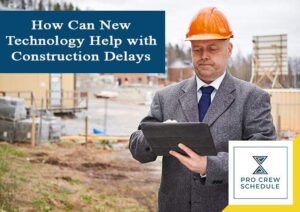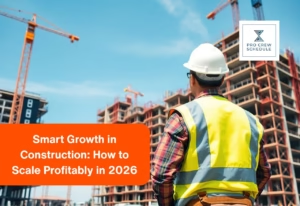Construction delays can cost lots of time and money, and if it happens often enough, it could even result in the total shutdown or cancellation of the project. It is a problem that plagues the construction industry despite the best efforts put into a company’s construction scheduling software. Many factors can contribute to construction delays: the local and global economy, availability of workers, logistics issues, and others that are out of the company’s control.
Fortunately, despite the challenges brought about by the pandemic (or perhaps, one can argue, it is because of the pandemic), the construction industry has evolved, both in methodology and in technology, to help combat construction delays. Technological innovations in project management for construction, Internet of Things connected sites and equipment, autonomous machines, among other things, have all helped improve construction planning and scheduling, dealing with issues and solving problems that arise, and more.
Here are ways how new technology can help deal with construction delays, make construction projects more efficient, and even improve the overall safety and well-being of the workers, engineers, and project managers.
Real-Time Verification
Several industry reports have found that between 5-12% of total construction budgets are used in fixes and rework alone. Not only does this translate to losing a lot of money but to additional construction time as well. This means that making sure that regular verification of the project is critical to save time and money and prevent construction delays.
The same report says that verification technology has already existed for many years. However, it has not advanced enough yet that it can make the process quicker and cheaper. The high cost and need to outsource to third-party scanning firms usually meant that verification scans would happen less frequently. This would often lead to mistakes or variations in the original plan, leading to the inevitable need to fix and rework sections of the project.
Advancements in verification have resulted in software and hardware that allow for quick, frequent, and affordable verification at any stage of the construction project. An example of this is the GTL-1000 along with Topcon’s MAGNET and ClearEdge Verity software. Further advancements in this field could potentially point to the total elimination of the need for reworks in the future. This is because being able to conduct verifications would instantly identify problems or unexpected variations in the design, making it easier and faster to employ the methods necessary to fix them.
Artificial Intelligence Assistance
It is a fact that construction advancements have leapfrogged and resulted in 29% of firms investing significant sums of money in technology so as to supplement worker duties 2019. In addition to this, 70% of contractors believe that advancing technology increases worker safety, efficiency and makes construction crew management that much easier to do.
One of the advancements being made is the use of AI for construction workflows. These are designed to assist both managers and the workers themselves. Construction projects can be very complicated and can require teams composed of many engineers and experts in order to pull off the project without a hitch.
Unfortunately, because the workflows are often done manually, it can lead to disconnections and loss of essential data and information. This can result in inefficiencies throughout the project.
Optimizing the areas of construction workflows—communication, data, and transparency—is crucial in ensuring maximized profits and productivity, and this is where AI comes in. Artificial Intelligence checks all these three areas at superhuman speeds, reducing the need for manual labor and cutting down the time and money necessary.
Artificial Intelligence Assistance in construction workflows can improve industry profits by up to 71% by 2035 rolls around, so this is another incentive for companies to invest in cutting-edge technology.
According to Digital Builder’s report, two notable products in this field are to be looked at: Pype’s Smart Plans and Smartvid.io’s Vinnie. Both use AI, with Smart Plans managing critical construction items such as spec books, submittals, and the like. In contrast, Vinnie ensures safety protocols are followed, thus increasing worker safety, minimizing risks, and providing automated quality assurance.
Advanced 3D Printing
When 3D printing hit the mainstream, everyone realized that it would be a certainty for the technology to be part of the construction industry on a grand scale. Why? In addition to creating construction sections quickly and easily, minimizing the need for labor, and allowing for the construction of more elaborate and intricate designs, 3D printing is shaping up to be more cost-effective, more sustainable, and more flexible than common conventional construction methods.
One notable example of this is Europe’s first industrial and commercial 3D printing factory by Royal BAM Group NV and Saint-Gobain Weber Beamix. What started as a project to 3D print a bridge out of concrete ended up opening a dedicated factory for concrete printing elements, ready to be shipped to any construction site that needs them.
Cutting-edge HR Tech
At the end of the day, the heart and soul of any construction project are its people. However, administrative processes necessary in any construction project can be quite tedious, which is why these days, more and more companies are turning to advanced HR technology and outsourcing solutions.
According to a survey done in 2019, nearly 80% of construction companies are using HR technology in order to simplify and, most importantly, automate the many tedious HR tasks that will ensure only the best people are retained in a company.
Examples of these tasks include the following:
● Time tracking – workers can now clock in and out using their smartphones and supervisors can easily track the time.
● Background checks and worker integration – apps can now quickly collect the necessary information of new hires to be assessed by the supervisor or the HR team.
● Automated payroll processing – using the time tracking software that supervisors and workers use, payroll can automatically be computed and distributed to the recipients.
Advancements in HR tech like these are crucial considering the ongoing skilled worker shortage being experienced due to the COVID-19 pandemic.
Remote Working and Collaboration Technology
Being able to communicate with the construction project’s team of experts, from architects and engineers to owners and workers, is crucial in ensuring timely decision-making and avoiding construction delays. Advancements in collaboration technology will allow construction teams to collect information in real-time and share it with others for their input and comments.
The use of advanced mobile apps will allow for quick and easy document sharing, data collection, and more. This will decrease downtime and errors significantly and make decision-making much faster in unforeseen circumstances.
In addition to this, remote working technology will allow experts, despite being located away from the construction site, to still work with teams, making sure that the project keeps moving forward. The combination of Augmented Reality and Virtual Reality results in Immersive Reality, which integrates VR’s immersion in the digital world and AR’s digital elements brought to the surroundings in real-time.
IR collaboration platforms allow teams to work together from any location, exchanging designs and ideas, and reporting back to the clients for feedback and review. One such example is The Wild, which gives teams involved in a construction project to work together in an immersive way.
Remote working and collaboration technology are crucial in today’s situation. Social distancing, border restrictions, and shortages in skilled workers have become part and parcel of everyday life in the construction industry. And it seems like this will be the trend moving forward. A report by Construction.com stated that up to 50% of civil contractors and 67% of commercial contractors had adopted remote working and collaboration software during the pandemic, and up to 35% have said that they will continue employing remote working procedures long after the pandemic is over.
Conclusion
Advancements in modern technology have moved our society and our industries forward, and in the construction industry, these advancements will ensure that construction delays become a thing of the past.
These five examples will guarantee that no project would require rework and changes anymore with up-to-date verification hardware and software. Artificial intelligence will eliminate mistakes in many processes while greatly shortening the time required for these tasks. Advanced HR technologies will ensure companies hire and retain the best people possible in the quickest time possible. Advancements in 3D printing will allow for the creation of concrete parts fast and give the capability to create intricate and complicated construction designs. And finally, remote working technology will connect people online, allowing for quick sharing of information as well as collaboration between teams across vast distances.
All of these advancements will, without a doubt, eliminate not just construction delays but most, if not all, of the construction problems that are not dictated by global factors. The future is definitely looking bright for the construction industry!







